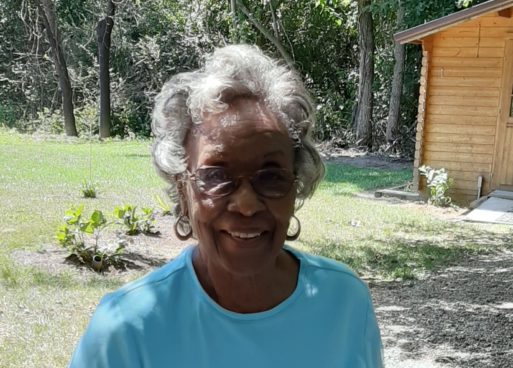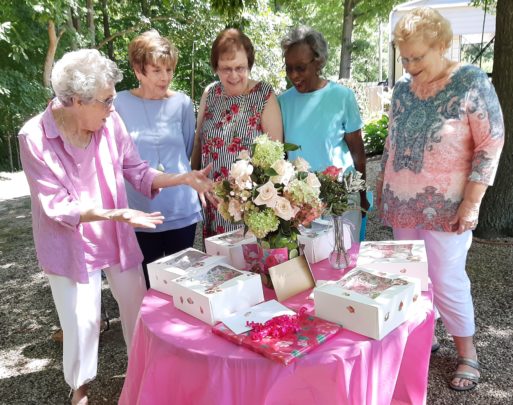This is Melissa’s story as told by her. Our “Opening Our Hearts” stories are based on people’s real-life experiences. By sharing these experiences publicly, we hope to help our readers feel less alone in their grief and, ultimately, to aid them in their healing process. In this story, Melissa talks about her friend and fellow educator Gladys, who, after years of selflessly serving her community, is now slowly disappearing due to the ravages of Alzheimer’s disease.

“Have you talked to Martha lately?”
Gladys smiled at me, nodding, starting the conversation by asking about our mutual friend. She asked the question, then turned her head to the side, looking at the people sitting in on the other side of the restaurant while we waited for our pancakes and hot tea.
“Well, as a matter of fact, I just talked to Martha last night,” I responded. “She’s well. Nothing new to report, but she’s looking forward to all of us having lunch together next week.”
Gladys turned her beautiful face back towards me, muttering softly,
“That’s good. That’s good.”
Simple Words. Powerful Memory
“That’s good. That’s good.”
Those words took me back 30 years. I could see Gladys sitting across from me at the lunch table at the community college where we both taught. I was recounting the difficulty of having a student in the class who clearly hated my guts. The young woman was hostile, belligerent, and had toxic fumes of dislike emanating off her, poisoning the classroom atmosphere.
A young teacher, popular with students, I was alarmed and bewildered by the vehemence of this student. As I talked about it at the lunch table, Gladys looked me straight in the eye and said,
“That’s good. That’s good. It’s good that you’re acknowledging a problem instead of ignoring it. Now, you just need to approach it head-on. You find a moment after class or before class, or invite this girl to your office. Say to her: ‘I feel like there’s some kind of conflict or problem going on between us. Tell me what the issue is.’”
Then, as now, Gladys’ punctuated every statement with musical laughter, a deep, mellifluous sound that makes me feel wonderful whenever I hear it.
“Now, don’t you be afraid, girl. You’ve done nothing wrong. Just confront her and find out what the problem was.”
Turns out there,was no problem with me at all. This angry young woman just had a dislike for the world around her, but after I asked her what was wrong, her attitude softened. She was less outwardly corrosive from that point on.
Thank you, Gladys.
Gladys Then Versus Gladys Now
Remembering that conversation years ago only emphasized the difference in Gladys then and now. She had always been a beautiful woman, immaculately dressed in outfits that were classy and coordinated. Her velvety brown skin never showed wrinkles, the perfect backdrop for her wide and constant smile. Her face was full, her cheeks rounded, her eyebrows perfectly shaped and almost always arched up in an expression of delight.
Her once fleshy, huggable body was so fragile I could no longer put my arms around her without fear of hurting her.
Now, she was wasted away to almost nothing. Her clothes hung on her toothpick-sized frame, sails flapping on a stick. Her once fleshy, huggable body was so fragile I could no longer put my arms around her without fear of hurting her.
I remembered the strong, resolute, articulate Gladys of the past. I saw the unsure, unfocused, diminished Gladys of the present, her exuberance evaporating into the air around us. Her eyes vacillating between presence and absence.
From vivacious to vacant. From passionate to passive.
I ate my pancake. She nibbled at hers. I drank a cup of tea. She took one sip of hers. Then she looked at me like it was the first time she’d seen me that morning and asked again, for the fourth time in 20 minutes,
“Have you talked to Martha lately?”
My heart broke.
What a Difference a Year Makes
All her life, Gladys was a shining light for the community. She grew up without money but with a hard-working mother who believed in education.
Gladys won a scholarship and went to college to be a teacher. Her specialty was Early Childhood Development, not just a degree on paper, but a lifetime of commitment to kids.
For decades, she’s volunteered every spare hour to teach classes, do private tutoring, and mentor kids at the local community center.
Over the last 60 years, Gladys has been a beacon of hope to underprivileged children, a human torch of encouragement and optimism throwing sparks of inspiration to thousands of students. For decades, she’s volunteered every spare hour to teach classes, do private tutoring, and mentor kids at the local community center. She served on the school board with a passionate mission to bring a voice for minority and underprivileged children to the table.
Now, that glowing paragon for education has sputtered out.
She can’t remember anything for more than a couple of minutes. She is often confused and sometimes agitated. She is mad that no one lets her drive anywhere anymore. But most of the time, she just smiles and nods, uttering a few, familiar phrases as she tries to keep up her end of the conversation.
Her eyes flit around the room before falling on me.
“Have you talked to Martha lately?”
Gladys-Guilt and the Signs We Should Have Seen
Thirty years ago, a group of women educators, all of us teachers or employees at our local community college, became friends. Over three decades, we have traveled together, celebrated together, cried together. We’ve mourned the loss of spouses and partied at weddings, graduations, and showers. We’ve had a long, rich friendship between loving, compassionate, educated women.
We should have seen it coming.

Our tight-knit group celebrates our friend Martha’s birthday.
Looking back, I can put the signs together, and I’m burdened with guilt. How could we not have known what was happening to Gladys? How could we ignore the symptoms of Alzheimer’s? Why were we not more proactive in helping her?
We should have seen the signs.
Two years ago Gladys started losing a lot of weight. I was convinced she had some kind of cancer, dropping pounds the way she was, but since she was never one to go to the doctor and never one to complain, she was noncommittal. A few months later, I pressed her for an answer because no one loses 40 pounds in a year without a reason. Her response?
“Well, you know, sometimes I just get so busy I forget to eat.”
Silly me. I bought it. I do that, too. Sometimes I’m so busy or so involved in a project that I just don’t stop to eat.
Her pants are held up by ropes or belts, and her sweaters wrap around her twice.
What I realized later is not that she was so busy that she didn’t have time to eat, but that she doesn’t REMEMBER to eat, a different thing altogether. She’s about five foot six, and she now weighs less than I do. (I’m five foot tall and a hundred and ten pounds.) Her pants are held up by ropes or belts, and her sweaters wrap around her twice.
Then there was the Christmas party.
Everyone forgets things sometimes, and Gladys was notorious in the Liberal Arts department for misplacing her keys, so none of us worried when she would lose or misplace things.
We should have known something was amiss when two years ago she didn’t show up to our annual Christmas Party, which was a big deal, a festive event with gifts and decorations and the whole shebang of festivities, planned well in advance.
Instead of worrying, we just wrote her forgetfulness off to the fact that she had never embraced email or smartphones and had just forgotten to write down the date.

We should have known something was amiss when two years ago she didn’t show up to our annual Christmas Party.
I began to sense things were really going wrong when, at one of our monthly lunch gatherings, I asked her how it was going with the school board. “What’s the school board working on now, Gladys?”
Her response, a chuckling, head-shaking, throwing her hands up and laughing retort:
“Well, girl, I don’t even know!”
It was a weird response, a generic kind of cover-up. I wondered about it, but then I decided she didn’t want to talk about it, eschewing the politics and keeping the confidentiality that she was elected to protect.
I was wrong. She really didn’t know.
We should have paid more attention when Gladys’ family started being vocal about helping her.
First, when I reminded Gladys of an upcoming outing in the presence of Crystal, her baby sister, Crystal said, “Don’t tell her. Tell ME. I’ll be sure she gets there.”
At the end of the outing, Gladys couldn’t find her keys. We were used to that.
About six months later, we’d had an afternoon gathering for another friend and former colleague who had flown in from California to be with us. At the end of the outing, Gladys couldn’t find her keys. We were used to that. It was not an atypical experience.
But when we called her husband to bring her the extra set of keys, he was livid.
“I thought you were her friends! Why aren’t you watching her? Why aren’t you taking care of her? You KNOW how she is.”
We DID know how she was. Forgetful. Absent-minded, maybe. But we didn’t know the full extent of “how she was” because we didn’t live with her. We hadn’t seen the day-to-day confusion, the continual need for vigilance to keep her safe.
The Fog of Alzheimer’s
Looking back over the last two years, we see now what we should have seen earlier. Gladys was declining fast, a rapid descent into a murky miasma of mental hell. Two months ago, doctors officially diagnosed Gladys with Alzheimer’s.
Of course, there is no “getting better.” Her Alzheimer’s disease won’t be miraculously reversed. She won’t recover her brilliance. She won’t light up again with talk about children, classroom tactics, or education.
She won’t remember to eat, to bathe, to respond in the appropriate manner. She won’t remember who we are.
She won’t remember what day it is or what we’re doing.
Last month, we had lunch to celebrate my birthday. Throughout our meal, Gladys would pipe up,
“Now, is this my birthday?”
“When is my birthday?
“Who’s birthday is it, anyway?”
“Is my birthday TODAY?”
The Hurt and the Hope
My own parents died of heart disease and stroke, painful enough, to be sure. But watching my friend’s mental acuity evaporate into a fog is a different and difficult experience.
Watching Gladys disappear hurts.
No one knows what goes on in the minds of Alzheimer’s patients, but I can only hope they don’t know how they’ve changed. I can only hope they don’t sense the drastic changes occurring in their minds and that they don’t know how much they’ve forgotten.
When she dies, I hope that she has no idea of how deeply her friends grieved or how much they lost when her mind started disintegrating.
I hope when Gladys drifts away into the mist of memory loss, she isn’t aware of how far away she’s going. When she dies, I hope that she has no idea of how deeply her friends grieved or how much they lost when her mind started disintegrating.
The Idea of Ambiguous Loss
Not long ago, I read a book titled “Hit Hard.”It was about a family whose son suffered an injury on the football field that left him with a brain injury. That book introduced me to a concept called “ambiguous loss,” a term that can be applied to people whose physical bodies are still with us, but who really aren’t the same people they were.
I suffer ambiguous loss every time I see Gladys. I grieve each time I see her face turn vacant and dark, remembering that brilliant light she had shone on all those students. I mourn the loss of her passion for kids, for the service she gave the community, for the years and years of shared friendship she won’t remember.
She’s still here, but she’s no longer that shining beacon of light she once was.
Once in a while, I glimpse a spark in her eyes, but it’s more like the faint and distant flickering of a firefly far away in the woods that comes on for a second, and then goes off, lighting up again dimmer and farther away.
I try to appreciate the time we have left while she still knows who I am.
I try to enjoy her smile and her laughter while she’s still capable of making it.
I try to patiently keep the conversation going before her thoughts evaporate into the very air around us.
But my heart breaks for the 50th time that morning as she turns to me, smiling, and asks me yet again,
“Have you talked to Martha, lately?”

 Watching Gladys Disappear –The Pain of Ambiguous Loss
Watching Gladys Disappear –The Pain of Ambiguous Loss



 Funeral Favors Offer Visitors a Tangible Memento
Funeral Favors Offer Visitors a Tangible Memento
 “Comeback” by Prince
“Comeback” by Prince
 “Other Side” Documents Woman’s Fight To Die As She Wishes
“Other Side” Documents Woman’s Fight To Die As She Wishes














